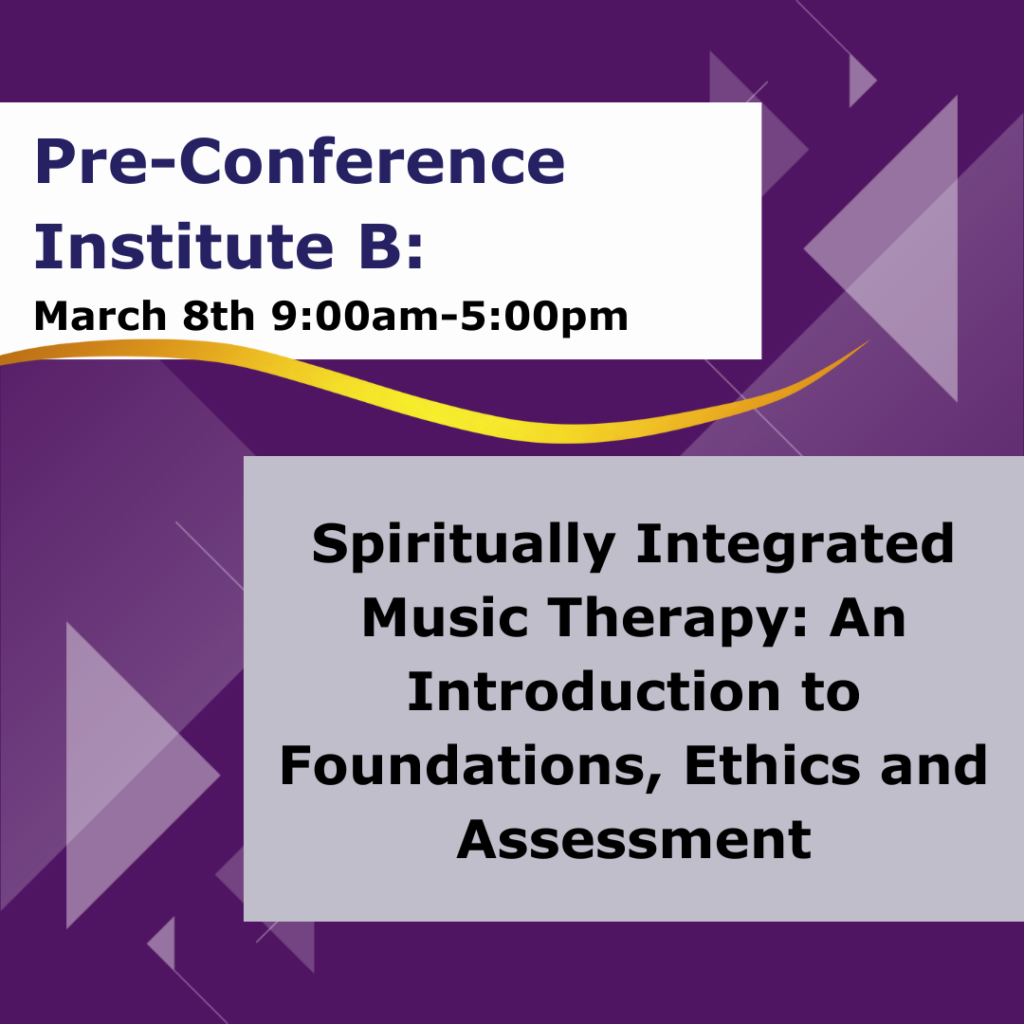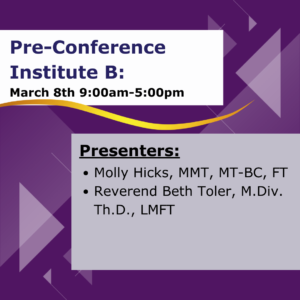Pre-Conference Institute A: March 7th-8th 9:00am-5:00pm
Orienting Our Perspectives of Trauma:
A Review of Primary Considerations in Music Therapy


Abstract: Receiving increasing attention since the events of 9-11, 2001 and exacerbated by pandemic crises, this presentation is designed to clarify and crystalize current understandings of trauma and trauma-related issues in music therapy practice across core treatment areas and diverse presenting trauma sequelae.
Music therapy treatment perspectives in working with trauma and posttraumatic stress disorder has received increasing attention in the literature, particularly since the events of September 11, 2001. With this heightened sensitivity and increasing awareness, further exacerbated in response to recent pandemic crises, there is a necessary growing urgency to prepare ourselves to address the broad range of presentations through which experiences of trauma may both surface and occur within any professional music therapy setting. However, research and the clinical practice standards are slow to develop and many music therapists struggle to decipher and integrate the burgeoning amount of information on trauma into clear knowledge and resource tools for use within diverse scopes of practice. The purpose of this panel presentation is to clarify and crystalize current understandings of trauma and trauma-related issues in music therapy practice. Foundational principles of trauma will be reviewed and expert music therapy panelists will address primary issues in music therapy and trauma across core treatment areas, such as: body-centered, medical, mental health, rehabilitation and neurology, education and academia, early child development, and veterans and the military. In addition to individual panelist presentations, this panel format will highlight specialized moderator-curated and audience-solicited question and answer periods to promote open forum scholarly discussion on additional areas of related inquiry, such as resilience and post-traumatic growth, socio-cultural influences, and ethical considerations.
Presenters:
Kristen Stewart, MA, LCAT, MT-BC, is the Assistant Director of the Louis Armstrong Department of Music Therapy and a PhD candidate at Temple University.
Frank Bosco MA, LMT, RPP, SEP, LCAT, MT-BC, is a Certified Music Therapist, trauma, Gestalt and massage therapist, and co-founder/director of Sound Health Studio in New York City.
Andrew Rossetti, PhD, LCAT, MT-BC is the Director of Oncology services within the Louis Armstrong Department of Music Therapy at Mount Sinai in NYC, specializing trauma and radiology oncology.
Kathleen M. Murphy, PhD, LCAT, MT-BC, is the Program Director, Graduate Studies in music therapy at the State University of New York at New Paltz.
Annie Heiderscheit, Ph.D., MT-BC, LMFT, is the Director of Music Therapy and Associate Professor of Music, overseeing both the undergraduate and graduate music therapy programs at Augsburg University.
Michael Zanders, PhD, MT-BC is Assistant Professor of Music Therapy at Temple University. His research includes clinical theory, practice, and youth in the child welfare system.
Rebecca Vaudreuil, EdM, MT-BC is the Lead Music Therapist at Henry M. Jackson Foundation for the Advancement of Military Medicine as part of the National Endowment for the Arts Initiative.
Pre-Conference Institute B: March 8th 9:00am-5:00pm
Spiritually Integrated Music Therapy:
An Introduction to Foundations, Ethics and Assessment


Abstract: The intersections of religion, spirituality and the practice of music therapy are intuitive and organic, yet many music therapists feel the need for additional skills with which to engage these issues. Participants will learn the benefits of addressing religious and spiritual issues with clients from an ethically-grounded and self-aware foundation.
The intersections of religion, spirituality and the practice of music therapy are intuitive and organic, yet many music therapists feel the need for additional skills with which to engage these issues in depth. The music therapy profession is experiencing both a strong interest and an urgent need to deepen clinicians’ ability to engage with the biopsychosocial, spiritual and cultural needs of the individuals they serve. This CMTE session is designed to be an introduction to the integration of religious and spiritual needs of clients within the music therapy setting, beginning with defining relevant terms and understanding the specific benefits of this approach to practice. Spirituality and religion are important to many clients, and they often wish to explore the music that expresses their beliefs and values as they work toward their therapeutic goals. Participants will consider the religious location of their clients and how to listen more deeply for spiritual themes. The presenters will situate all material within a biopsychosocial-spiritual framework that centers culturally humble and responsive care. Participants will review the AMTA Code of Ethics as it relates to provision of religious and spiritual care, with the additional context of related professions’ ethical codes. The presenters will explore how the therapist’s religious and spiritual beliefs and experiences influence the therapeutic process. Participants will be introduced to dynamic ways of assessing clients’ spiritual resources and struggles, both musically and verbally. Clinical examples will be provided. Implicit and explicit spiritual resources will be defined, and participants will be encouraged to think broadly about what constitutes a spiritual resource or struggle. The presenters hope that participants will leave the session inspired to continue the learning process and develop innovative music therapy experiences to meet the religious and spiritual needs of their clients.
Presenters:
Molly Hicks, MMT, MT-BC, FT is a bereavement coordinator with Penn Medicine Hospice in the Philadelphia, PA area, where she serves bereaved adults through individual counseling and support groups.
Reverend Beth Toler, M.Div. Th.D., LMFT is a Licensed Marriage and Family Therapist, and Associate Professor of Clinical Counseling and Pastoral Care at Moravian Theological Seminary, Bethlehem, PA.
